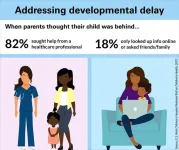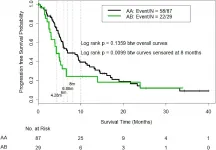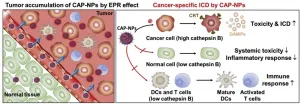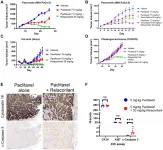(Press-News.org) 28 June 2021: Only now, more than a year after Covid-19 infection rates first hit peak levels and in the knowledge that receptors for SARS-CoV-2 are present in the ovary, are we able to assess the effect of the virus on reproductive function. Now, a new study has shown that the ovarian reserve of women previously infected with the virus was not adversely affected, and that their chance of success from fertility treatment remained as it was before infection.*
The study, which monitored hormone levels in women having IVF at one of 11 clinics in the IVI group in Spain between May and June 2020, is described today by Dr Maria Cruz Palomino from IVI Madrid at the online annual meeting of ESHRE.
All the women in the study had baseline hormone measurements before starting treatment, which included measurements of anti-Mullerian hormone (AMH, as a marker of ovarian reserve). AMH has become a widely used measurement in fertility clinics in recent years, able to predict how patients might respond to ovarian stimulation in IVF - although its reliability as a marker of general female fertility is more disputed.
The study included 46 patients having IVF whose baseline measurements of AMH suggested they would be normal or low responders to ovarian stimulation when treatment began. "Generally," said Dr Palomino, "the data showed no variation in AMH levels before and after SARS-CoV-2 infection, and we could assume that the chances of success in their fertility treatment remained intact." However, the results did show a slight decline in AMH measurements in those predicted to be normal responders, which Dr Palomino said was not a "radical decrease" and unlikely to compromise ovarian reserve - nor, she added, "can we attribute this variation to SARS-Cov-2 infection".
Several studies reported so far have been reassuring about the effect of Covid-19 infection on female fertility, and this provides further reassurance for those planning fertility treatment with IVF. Experts have described intrauterine infection via placental or congenital routes as unlikely, and reported that perinatal infection found at and after delivery was a more likely explanation for any neonatal infection.
This, as Dr Palomino explains, was a small study and not robust enough for emphatic public health conclusions, but it does join others in suggesting that ovarian function, as reflected in AMH measurements, is not affected by SARS-Cov-2 infection. There have been concerns because the virus invades its target cells by binding to the ACE2 receptor, which is widely expressed in the ovaries (as well as the uterus, vagina and placenta). The SARS-CoV-2 virus has been said to interrupt female fertility through regulating ACE2. This has caused some anxiety for women contemplating fertility treatment, and this latest study suggests that, while there was a variation in levels of AMH as a marker of ovarian reserve, this variation appeared dependent on patient response to ovarian stimulation, not on previous infection. "Nevertheless," said Dr Palomino, "we could assume that the chances of success of fertility treatment remain intact." The results reflect those of a recent study from Wuhan, China, which similarly found that average sex hormone and AMH concentrations of women of child-bearing age with COVID-19 were not different from those of age-matched controls.(1)
INFORMATION:
Presentation 0-079, Monday 28 June 2021
Could ovarian reserve be affected after SARS-CoV-2 infection?
* Ovarian reserve
Ovarian reserve describes the ability of the ovary to produce eggs for fertilisation (natural and medical) and pregnancy. Because of the ovary's fixed store of eggs which depletes over time, ovarian reserve is known to decline, beginning at around the age of 35 and continuing to the menopause, when reproductive function stops. Diminished ovarian reserve and decline in egg quality are known to explain the decline in fertility with age.
Tests of ovarian reserve, such as AMH and counting small early follicles in the ovary (by ultrasound), will thus give an indication of how many egg follicles remain in the ovary, but will not provide an accurate prediction of fertility. Some women will get pregnant with low markers of ovarian reserve, while others with high measurements will not. However, AMH test results have been found to correlate closely with how women respond to ovarian stimulation for IVF, thereby predicted as normal, low (few eggs produced) or high responders (many eggs produced and with them a risk of ovarian hyperstimulation syndrome).
1. See Li K, Chen G, Hou H, et al. Analysis of sex hormones and menstruation in COVID-19 women of child-bearing age. Reprod Biomed Online 2021; 42: 260-267.
ANN ARBOR, Mich. -- As their infants and toddlers grow, many parents may wonder if their children are walking, talking and socializing when they're supposed to be.
In fact, nearly a quarter of parents have suspected their child might be delayed in their development, a new national poll finds - but they may not always share these concerns with a doctor.
Among parents who worried that their child was behind in hitting milestones, nearly one in five did not seek advice from a healthcare or childcare provider, according to the University of Michigan C.S. Mott Children's Hospital National Poll on Children's Health.
"Parents may be unsure whether their child is progressing appropriately for their age and are on track with ...
Arlington, Va., June 28, 2021 - Designed initially for entertainment purposes, escape rooms are proving their value as medical training tools as demonstrated by the Central Texas Veterans Health Care System. Staff there have used the concept for a flu pandemic escape room and is reporting increased staff handwashing and acceptance of flu vaccines as a result.
The escape room is the brainchild of Gracia Boseman, RN, MPH, and Kristy Causey, MSN, RN, who are END ...
Sophia Antipolis - 28 June 2021: A study in more than 200,000 individuals has found that patients with heart failure are more likely to develop cancer compared to their peers without heart failure. The research is presented today at Heart Failure 2021, an online scientific congress of the European Society of Cardiology (ESC),1 and published in ESC Heart Failure, a journal of the ESC.2
"This was an observational study and the results do not prove that heart failure causes cancer," said author Dr. Mark Luedde of the Christian-Albrechts-University of Kiel and Cardiology Joint Practice Bremerhaven, Germany. "However, the findings do suggest that heart failure patients may benefit from cancer prevention measures."
Heart failure affects around 65 million people ...
Oncotarget published "The presence of polymorphisms in genes controlling neurotransmitter metabolism and disease prognosis in patients with prostate cancer: a possible link with schizophrenia" reported that polymorphisms of neurotransmitter metabolism genes were studied in patients with prostate cancer (PC) characterized by either reduced or extended serum prostate-specific antigen doubling time corresponding to unfavorable and favorable disease prognosis respectively.
The following gene polymorphisms known to be associated with neuropsychiatric disorders were investigated:
A. ...
Oncotarget published "Predicting clinical outcomes using cancer progression associated signatures" which reported somatic mutation signatures are an informative facet of cancer aetiology, however they are rarely useful for predicting patient outcome.
The aim of this study is to evaluate the utility of a panel of 142 mutation-signature–associated metrics for predicting cancer progression in patients from a ‘TCGA PanCancer Atlas’ cohort.
Cancer specific machine learning models were built using the output from the P142 panel to predict patient ...
Oncotarget published "Insulin-like growth factor 1/Child-Turcotte-Pugh composite score as a predictor of treatment outcomes in patients with advanced hepatocellular carcinoma treated with sorafenib" which reported that this study investigated the association of the IGF/CTP score with overall survival and progression-free survival of HCC patients treated with sorafenib.
The authors calculated the IGF/CTP score and used the Kaplan-Meier method and log-rank test to estimate and compare the time-to-event outcomes between patient subgroups.
171 patients were included, 116 of whom were CTP class A. Median ...
Unlike conventional cancer drugs that attack and kill cancer cells directly, anti-cancer immunotherapy, which kills cancer cells by strengthening the body's immunity, is a novel type of cancer treatment currently attracting increased attention. Unfortunately, a minority of cancer patients who have some degree of pre-existing immunity only benefit from anti-cancer immunotherapy.
Recently, 'doxorubicin', a cancer treatment drug, has been shown to boost patients' immune response by releasing various components when cancer cells are killed. However, as the toxicity and inflammatory responses induced by doxorubicin can affect normal cells in addition to cancer cells, it can lower ...
Oncotarget published "Glucocorticoid receptor antagonism promotes apoptosis in solid tumor cells" which reported that to guide studies in cancer patients, relacorilant, an investigational selective GR modulator that antagonizes cortisol activity, was assessed in various tumor types, with multiple cytotoxic combination partners, and in the presence of physiological cortisol concentrations.
In the MIA PaCa-2 cell line, paclitaxel-driven apoptosis was blunted by cortisol and restored by relacorilant.
A screen to identify optimal combination partners for relacorilant showed that microtubule-targeted agents consistently ...
PHILADELPHIA-- In addition to sickening and taking the lives of millions across the globe, COVID-19 complicated patient care in a range of less-direct ways, from increased incidence of END ...
HAMILTON, ON June 28, 2021 -- Researchers at McMaster University have developed a promising new cancer immunotherapy that uses cancer-killing cells genetically engineered outside the body to find and destroy malignant tumors.
The modified "natural killer" cells can differentiate between cancer cells and healthy cells that are often intermingled in and around tumors, destroying only the targeted cells.
The natural killer cells' ability to distinguish the target cells, even from healthy cells that bear similar markers, brings new promise to this branch of immunotherapy, say ...






